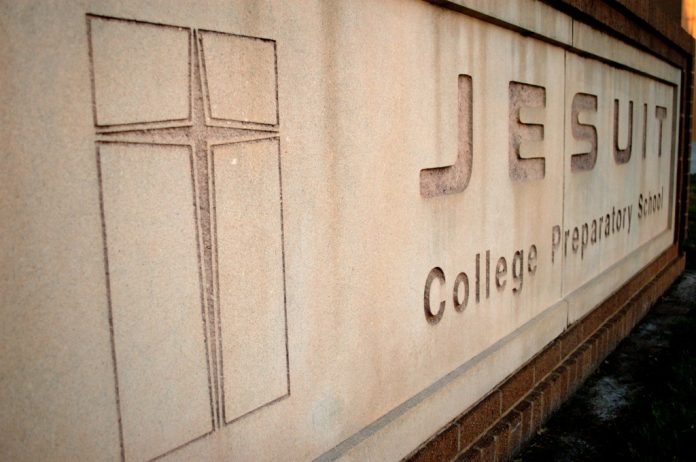As a student grabs his Styrofoam plate from the busy school lunch line, he swiftly walks to the Junior Commons. Facing an army of Jesuit students, he finally reaches his destination just as Mr. Paul McDaniel covers the criteria for the week’s meeting.
PALS, also known as the Peer Assistance Leadership Service, has grown over the years, directing the Junior Retreat that is held every year. In addition, the program aids other service projects in order to build leadership and brotherhood.
The first step in preparation to lead the Junior Retreat is the special and “secret” PALS only retreat in which they build friendship and leadership skills. In years past, the PALS retreat consisted of a ropes course that the members would complete; however, now they perform timed activities.
The goal during the activities was to beat the all-time record of that specific event. The PALS members seemed to enjoy the process and interaction more than beating the time, which is a big strength of the class.
Mr. McDaniel, Junior Counselor and PALS faculty moderator, commented that these activities show “the dynamics diverge from the activities. We can see if they show strong communication skills, if they enjoy themselves, or if they feel discouraged. It also gives them an indication of what their strengths and weaknesses are.”
Overall, Mr. McDaniel says this retreat is mostly used to “find the personality of the Class of 2015 and to get to know each other.” When Mr. McDaniel started as the faculty leader about 15 years ago, he had 16 PALS members. The guys earlier in Jesuit history tended to know more of their classmates, because they were all from similar areas of Dallas; however, today students are enrolled from all over the Metroplex, so participants may not know anyone else involved.
In further preparation for the Junior Retreat, PALS meets every week during lunch to go over specific scenarios that might go on during the actual Retreat. Chris Ayres ’15 says that the meetings are “always something new. Last meeting we talked about the strengths and weaknesses of our class.”
Even though the meetings are during their lunch periods, the members do not mind because they joined PALS to be with one another. Jacob Su ’15, another PALS member said that “the main reason [he] joined was because of the leadership opportunity.”
Ayres thought the same but also elaborated that the chance to be a small group leader at the retreat, will allow him “to get more out of the retreat, like it did sophomore year when I was a small group leader.”
With these great members buying in to the leadership idea of the group, they have one big goal that is called the midpoint check of the Christmas project. The goal of that is to gauge the effectiveness of informational communication, specifically seeing who follows a Moodle message directions and who needs multiple reminders. “Being persistent in reminding them to bring their gifts may be uncomfortable and strange, but that prepares them for the Retreat to face those who do not want to be there” states Mr. McDaniel. This is important because it enforces communication skills without harassing the junior class group, thereby enticing them to participate in this unique retreat.
In addition to the Junior Retreat, PALS leads other service projects before that event. Specifically, during the Christmas season, the members give presents to kids in Child Protective Service, a sign of commitment to community service.
Mr. McDaniel says that these projects “help with [the members] communication skills in preparation for the Junior Retreat,” because they are able to interact with the recipients of the service. as well as forcing themselves out of their comfort zone.
PALS is a great leadership group to be involved in. It teaches the Jesuit students the priceless skills of communication and leadership, as well as enforcing the Profile of the Graduate through the ideas of being open to growth and the commitment to working for justice.






